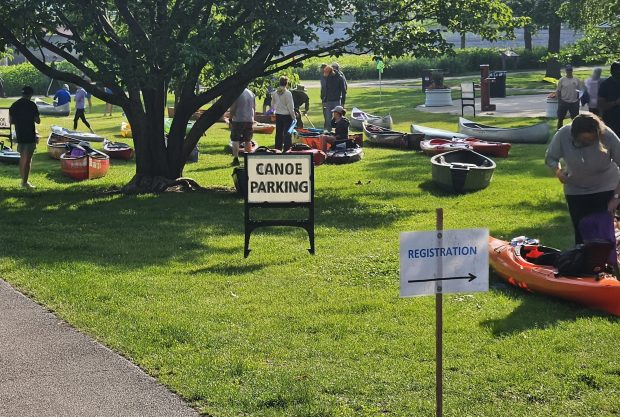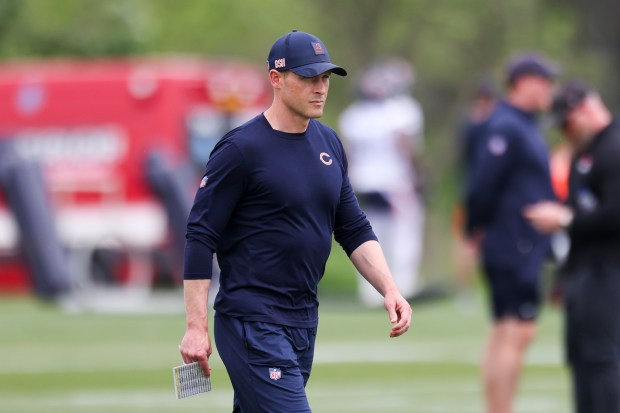Before University of Illinois Urbana-Champaign student Gabi DalSanto was cleared to register for spring classes after being placed on a recent academic hold for defying school policy during a student-led climate march, she filed stacks of paperwork, worked with a case manager and wrote a several-page essay on what she would do differently in the future.
“It felt like what you would do in detention — it was crazy,” DalSanto said. “It shows a really big shift in the university’s outlook on expressive action.”
DalSanto, a second-year environmental science major at U. of I., was among members of the Students for Environmental Concerns group who were charged for “violating campus policies” during a protest in the fall demanding the university divest from fossil fuels. Following the disciplinary procedure, the SECS group was given a four-year censure, or a formal statement of disapproval that puts the organization on a close watch.
Meanwhile, another student organization — Students for Justice in Palestine — started the school year without its status as a registered student group.
According to the ACLU of Illinois, U. of I. completely revoked SJP’s status at the end of the spring semester, in line with a crackdown on student protesters and a review of free speech policies following the encampments in April and May that called for the university to divest from its financial and institutional ties to Israel.
The ACLU of Illinois sent a letter last week to U. of I., warning administrators that recent changes to the institution’s speech and protest policies and “overzealous discipline of student protestors” are having a chilling effect on campus.
“The University has added several vague and arbitrary requirements and set violation thresholds that are far too low,” the letter, obtained by the Tribune, said. “As a result, student protestors have and will continue to be subject to an unpredictable disciplinary regime that effectively puts their academic careers at risk for engaging in protected speech.”
Edwin Yohnka, director of communications and public policy at the ACLU of Illinois, said the changes are heightened by the reality that many students will undoubtedly be moved to protest policies of President Donald Trump’s administration — from promises of mass deportation to pledges to roll back basic protections for reproductive health care and LGBTQ+ rights.
And implementing major revisions to free speech guidelines in the immediate wake of the Gaza protests “creates the potential appearance of a retaliatory motive,” he noted.
“I feel a lot of sympathy and empathy for the students. They feel like they’re part of a community and it feels a bit like betrayal to them to be punished for something that’s not violent, that’s not disruptive, that isn’t harmful,” Yohnka said. “It’s them simply engaging in free expression, and speaking out about an issue that they really care very much about, and both in the case of the SJP students and the environmental students, it’s something that they really, really think affects them directly and their lives going forward.”
In its letter, the ACLU of Illinois urged the school to revisit the policy changes in consultation with students and faculty.
In an email to the Tribune, U. of I. Associate Chancellor Robin Kaler said the recent revisions to campus policies were intended to “clarify the boundary between lawful exercise of First Amendment rights and activity that creates safety hazards or disrupts educational activities.”
Kaler said that on July 28, four policy revisions were posted for a two-week public comment period, and the campus community was notified through the weekly campus online newsletter. On Aug. 21, the policy changes were implemented and shared with stakeholders, including presidents of registered student organizations.
Yohnka said the university lost the trust of its students by making the changes in the summer, “when nobody was on campus” and leaving little room for community input.
Students in SECS were “surprised and confused” by the university’s charges against them, explained DelSanto, an action coordinator for the group. For over a decade, the climate march has followed the same route, starting and ending at the Alma Mater statue with stops at Foellinger Auditorium and the Swanlund Administration Building, she said.
Kaler said the behaviors related to the climate march violated “longstanding policies” related to obstructing pedestrian and motor vehicle traffic and using a bullhorn within 50 feet of a classroom and the Turner Student Services Building.
Student body President Rudy LaFave, a senior environmental economics and policy major and member of SECS, said the charges don’t add up. The group intentionally adjusted the yearly climate march, being cautious of the new restrictions in the student code. Still, a university official approached SECS speakers during the protest, demanded they identify themselves and informed them that “the university was watching on camera,” LaFave said.
LaFave said it reads to him as the university taking unnecessary steps to limit how students use expressive action on campus.
“I mean, there was a limit on chalking. You’re putting a 5-by-5 limit on chalking: It has to be 20 feet in front of the doorway, or you cannot hold a sign that is more than, I think it’s 10 or 12 feet high. Small stuff like that while under the presumption of time, place and manner with regard to free speech does have a really big chilling effect,” LaFave said.
“Even the idea that there is an amplified sound limit. But when the university comes out and says to us, ‘you can’t be doing that’ — there are no decibel readers,” he said.
The added oversight on student protesters is even more dire for students like Aya Mohammed, a second-year student at U. of I. and a member of Students for Justice in Palestine.
“We were just shocked; this was the ultimate power move that the university could pull, revoking our status as an organization, even though there’s hundreds of SJPs all across the country,” Mohammed said. “This is an organization that’s been around for decades that gives Palestinian students a voice. … It just shows that the university is trying to silence its own students for calling for divestment and disclosure of their investments.”
Even though the group has been disbanded, Mohammed said students who were listed as part of its leadership when SJP was registered are still being contacted by administrators to field occasional complaints.
“So if a student submits a complaint that SJP is allegedly saying something antisemitic, we would get that email as if we were still an RSO (registered student organization), even though our status has been revoked,” Mohammed explained. “They basically just took away all of our benefits, but still want to hold us accountable at the level of an RSO.”
Part of SJP’s school year programming has often included inviting a guest speaker — sometimes nationally known — and activities celebrating Palestinian culture through food and clothing, separate from politicized discussions. But decertified organizations aren’t allowed to reserve rooms or spaces on campus.
According to the ACLU of Illinois, SJP is not permitted to seek reinstatement until 2027. U. of I. has also required the leaders of SJP and two-thirds of its members to participate in mandatory training, regardless of whether the members participated in the encampment or resisted police attempts to remove it from campus during spring protests.
School leadership confirmed in an email to the Tribune that they revoked SJP’s status after a hearing panel determined that the group “promoted, hosted, sponsored, and/or engaged in an unapproved and unauthorized event and encampment on the university grounds,” referring to the protests between April 28 and May 10.
According to U. of I., the panel also determined that SJP “failed to comply and instructed others to not comply with university staff and law enforcement officials on April 26, 2024.”
Yohnka said it’s unfair to punish students for a protest that ended peacefully, without any of the issues seen on other campuses nationally, like overnight police raids. The encampment at U. of I. lasted for nearly two weeks, until students agreed to remove the encampment May 10.
“It’s collective punishment,” Yohnka said. “It’s a disproportionate response that leaves a massive hole in its members’ ability to effectively advocate in support of an important cause that personally impacts many of them.”
Kaler did not provide additional information regarding specific student complaints.
The ACLU letter to U. of I. comes amid a barrage of broader concern over a stifling of free expression on campuses across the country since the start of the Israel-Hamas war.
Zoha Khalili, a staff attorney at Chicago-based Palestine Legal, said the advocacy group is still finalizing its data entry for 2024, but the most recent records indicate that it received at least 2,374 requests for legal support last year. Khalil said 723 of those were incidents of suppression on university or K-12 campuses.
DalSanto, who helped organize the climate march, will graduate before the censure of Students for Environmental Concerns is lifted. Meanwhile, administration members told the organization that they’ll keep a close eye on its programs and educational events.
“It really makes me sad,” DalSanto said. “I always knew I wanted to go to U. of I. My mom is an alumni, my aunts, my grandparents are all alumni. So all of this stuff is scary because now I’m worried about my future here. It’s definitely concerning.”




